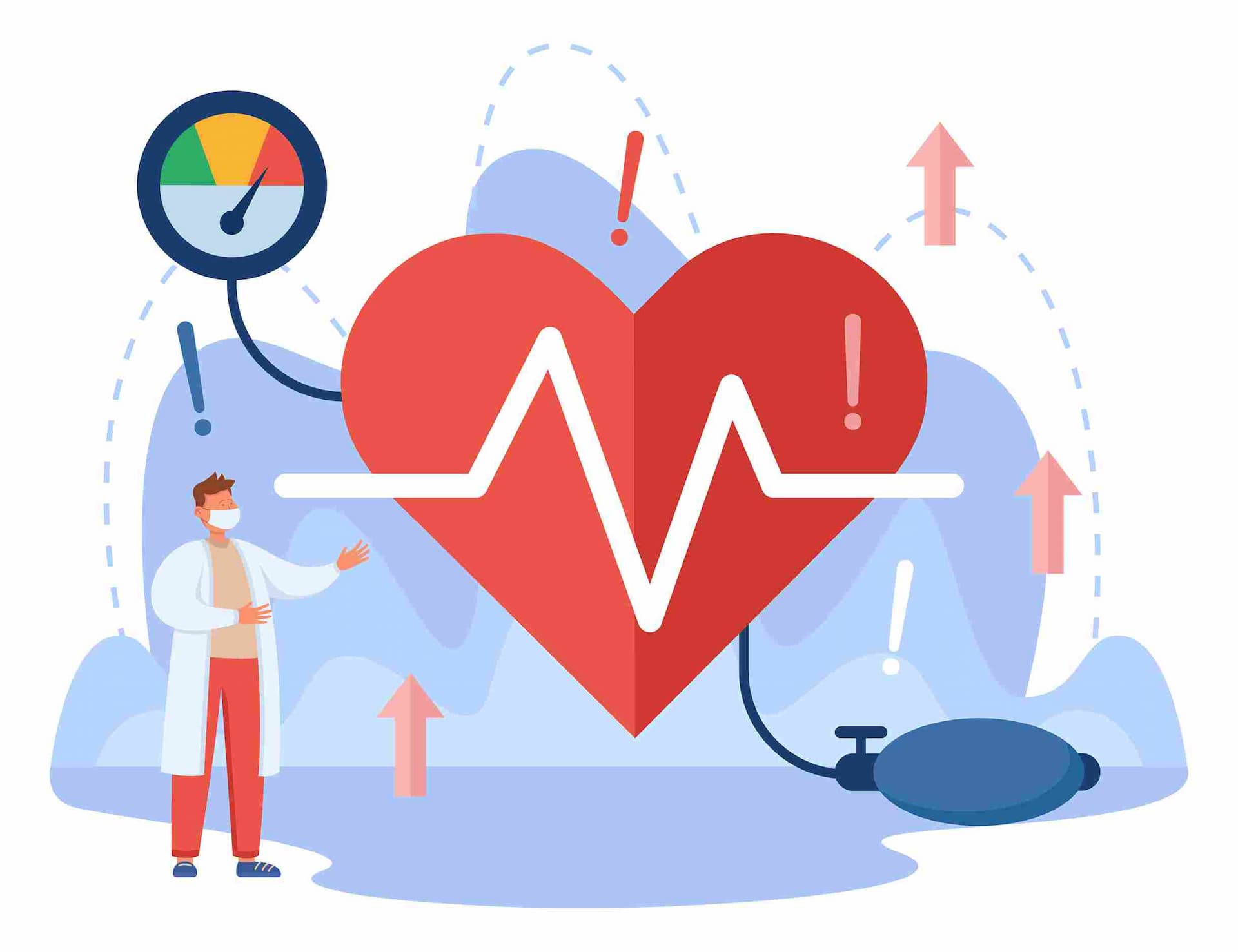Need For Cardiac Risk Markers Test, If You Are Diabetic

Medically Reviewed By
Dr Divya Rohra
Written By Kirti Saxena
on Sep 9, 2023
Last Edit Made By Kirti Saxena
on Mar 16, 2024

Living with diabetes comes with the risk of cardiovascular diseases. As per the Centers for Disease Control and Prevention (CDC), if you have diabetes, you are twice as likely to have heart disease or a stroke than others who do not have diabetes.
However, per statistics from the American Stroke Association, for people 65 or older with diabetes, an estimated 68 % die from some heart disease, and 16% die of stroke.
If you have diabetes, managing your health effectively and paying attention to more than just your blood sugar level is crucial. Managing diabetes and reducing the risk of heart disease aren't separate goals- they're closely related. Cardiac risk marker testing is valuable for assessing and mitigating this risk. In this blog, we will delve into the importance of Cardiac risk marker tests for diabetic patients.
Importance of Preventive Cardiac Marker Tests for Diabetes
Cardiac risk marker tests are important for people with diabetes to assess and manage the risk effectively.
- To assess the risk: Cardiac risk marker tests help to know the specific risk factors for heart disease. This allows healthcare providers to provide treatment plans as per needs.
- Early Detection: These tests assess cardiac risk at an early stage, often before symptoms appear. Early detection allows for timely intervention, reducing the risk of heart-related diseases.
- Comprehensive Assessment: While standard lipid profile tests measure cholesterol levels, cardiac risk marker tests provide a more comprehensive cardiovascular risk assessment. They evaluate factors such as inflammation, blood vessel damage, and heart muscle stress.
- Identifying Hidden Risks: People with diabetes may have normal lipid profiles but are still at high risk due to other factors like inflammation or insulin resistance. Cardiac risk marker tests can uncover these hidden risks.
- Preventive Measures: Regular testing allows monitoring changes in cardiac risk markers over time. By managing cardiovascular risk factors effectively, people with diabetes can reduce the risk of complications such as heart attacks, strokes, and peripheral artery disease and improve their quality of life.
What are Preventive Tests to Assess Cardiac Risk?
Cardiac risk markers tests are valuable in diagnosing and monitoring heart diseases, including heart attacks and heart failure. Here are some common preventive cardiac risk marker tests:
- NT-Pro BNP test: NT-proBNP is a biomarker produced by the heart in response to increased stress or stretching of the heart muscle. This test is primarily used to assess heart functioning.
- C-reactive Protein (CRP) Test: CRP is a marker of inflammation. High levels of CRP indicate a high risk of heart disease.
- Lipid Profile: This test measures various types of cholesterol, including low-density lipoprotein (LDL), high-density lipoprotein (HDL), and triglycerides. Abnormal lipid levels are a risk factor for atherosclerosis and heart disease.
- Homocysteine Test: Elevated homocysteine levels are associated with an increased risk of heart disease and stroke.
- Cholesterol Profile: This test measures LDL, HDL, and triglyceride levels. High LDL cholesterol and triglycerides are associated with an increased risk of heart disease, especially in people with diabetes.
- Hemoglobin A1c (HbA1c) Test: While primarily used to monitor diabetes, HbA1c levels indicate long-term blood sugar control, a risk factor for heart disease.
What Raises Your Risk for Heart Disease?
If you have diabetes, your risk of heart disease is already high. Here is what raises the risk for heart disease-
- Poor Blood Sugar Control: High blood sugar levels for a long time can damage blood vessels, increasing the risk of atherosclerosis (hardening and narrowing of the arteries) and heart disease.
- High Blood Pressure (Hypertension): Hypertension is a common comorbidity with diabetes. When both conditions coexist, it can lead to more significant cardiovascular damage.
- Abnormal Lipid Profiles: People with diabetes often have unfavorable lipid profiles, including high LDL cholesterol, triglycerides, and low HDL cholesterol levels.
- Obesity: Obesity is a significant risk factor for diabetes and heart disease. Excess body weight, particularly abdominal fat, is associated with inflammation and insulin resistance.
- Physical Inactivity: A sedentary lifestyle can worsen insulin resistance, contribute to obesity, and increase the risk of heart disease.
- Smoking and alcohol: Smoking and alcohol consumption are potent risk factors for heart disease as it damages blood vessels and increases the risk of atherosclerosis.
- Family History: A family history of diabetes and heart disease can increase your risk. Genetics can play a role in both diabetes and heart disease. You can take the predictive cardiac marker test troponin I test to diagnose the risk of heart attacks.
- Gender and Age: Men with diabetes are generally at a higher risk of heart disease than women with diabetes. As people with diabetes age, their risk of heart disease also increases.
Tips to Avoid a Heart Attack or Stroke
As per WHO, over 17.9 million people died from cardiovascular disease in 2019, representing 32% of all global deaths. The good news is that 80% of premature heart attacks and strokes are preventable. A healthy diet, exercise, controlling high blood pressure, high cholesterol, high blood sugar, and diabetes is important to reduce the risk of cardiovascular disease risks.
- Maintain a Healthy Lifestyle: Follow a balanced diet, engage in physical activities, and avoid smoking and excessive alcohol consumption.
- Control Blood Sugar: Consistently manage your blood sugar levels through medication, diet, and exercise.
- Manage Blood Pressure and Cholesterol: Regularly monitor blood pressure and cholesterol levels and follow your healthcare provider's recommendations for control.
- Stress Management: Find healthy ways to manage stress, such as meditation, yoga, or relaxation techniques.
- Avoid tobacco usage: Tobacco increases the risk of heart attack and stroke. Tobacco usage, including cigarettes and cigars, is dangerous for heart health.
Regular medical check-ups for heart health, like NT-Pro BNP test and taking prescribed medications timely, can help you achieve better cardiovascular health and overall well-being.
Takeaway
Cardiac risk marker testing is essential for people with diabetes to assess and manage their risk of heart disease. Regular testing allows for monitoring changes in cardiac risk markers over time. You can take the NT-Pro BNP test and cardiac risk markers tests from Redcliffe Labs. The professionals are NABL accredited and trusted by millions of people to provide accurate reports on time. These tests can detect cardiac risk factors early, providing timely intervention and prevention. Moreover, you can maintain a heart-healthy lifestyle by assessing your test reports and understanding cardiovascular risk factors. People with diabetes can take proactive steps to reduce the risk of heart attacks and strokes and lead healthier, longer lives.


